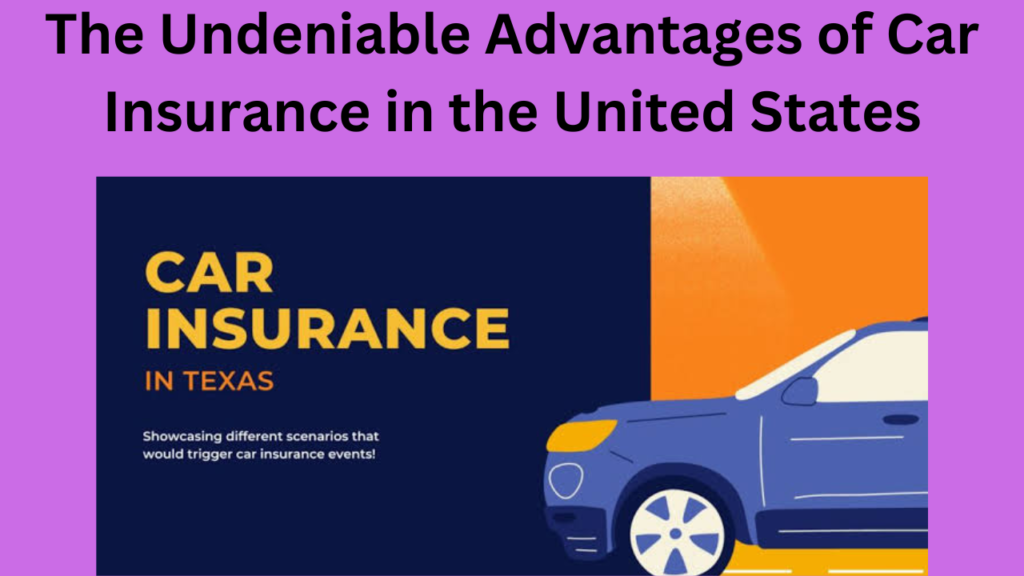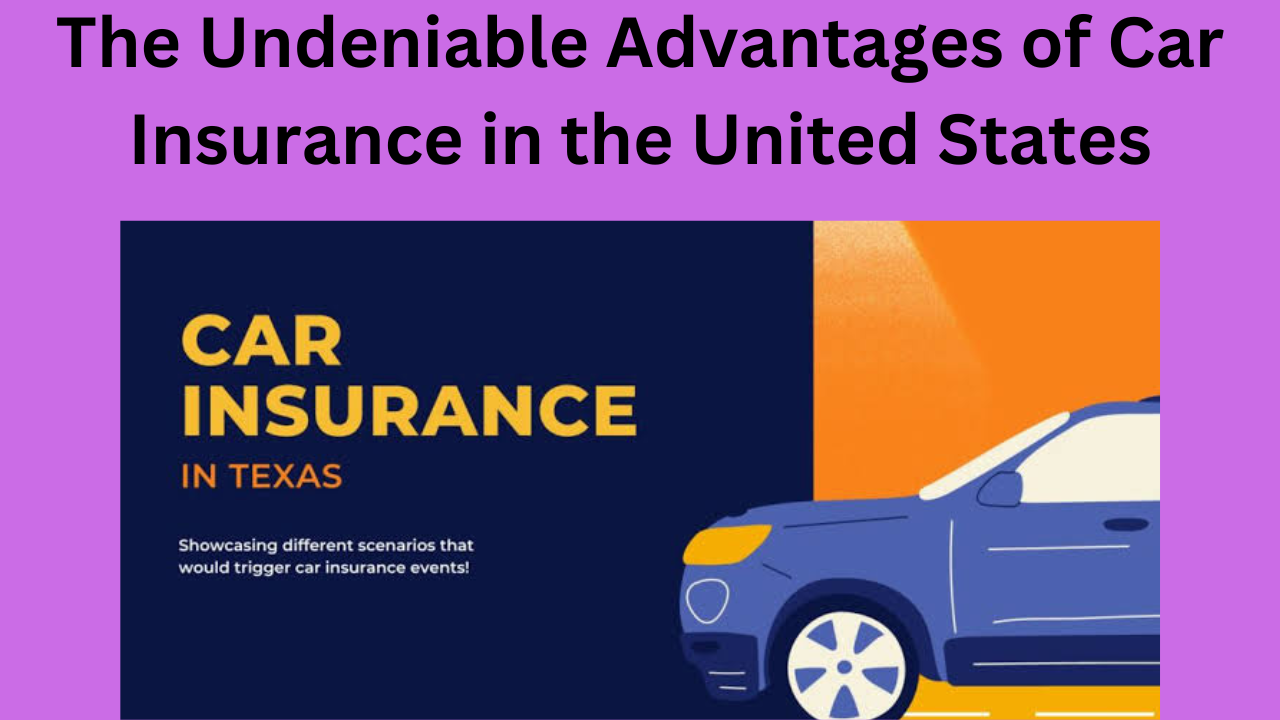
The Undeniable Advantages of Car Insurance in the United States
Introduction
Car insurance is a crucial investment for drivers in the United States, offering a multitude of benefits that extend beyond mere financial protection. It plays a pivotal role in ensuring the safety and well-being of individuals and society as a whole. This article delves into the various advantages of car insurance, highlighting its significance in a nation where driving is a prevalent mode of transportation.
1. Financial Protection
One of the primary advantages of car insurance is the financial protection it provides against the unforeseen costs associated with accidents. Accidents can happen to anyone, regardless of their driving skills or cautiousness. The expenses incurred from vehicle repairs, medical bills, and legal fees can be substantial, potentially causing financial hardship. Car insurance acts as a safety net, offsetting these costs and preventing financial ruin in the event of an accident.
2. Legal Compliance
Car insurance is mandated in almost every state in the United States. Driving without insurance can result in severe consequences, including fines, license suspension, and even legal action. By having car insurance, you not only safeguard yourself from financial losses but also adhere to the law, contributing to a safer and more orderly driving environment.
3. Medical Coverage
Many car insurance policies offer medical coverage, known as personal injury protection (PIP). This coverage helps pay for medical expenses resulting from a car accident, regardless of who is at fault. In a country where healthcare costs are high, having PIP can be a lifesaver, ensuring that necessary medical treatment is readily available.
4. Peace of Mind
Knowing you have car insurance provides a sense of security and peace of mind. You can drive with confidence, knowing that if an accident occurs, you’re covered. This peace of mind extends to your family and loved ones as well, as they can feel assured that you’re financially protected while on the road.
5. Protecting Others
Car insurance doesn’t only benefit you; it also protects other drivers and pedestrians. If you’re at fault in an accident, your insurance can cover the damages and medical expenses for the other parties involved. This promotes a sense of responsibility and accountability on the road, fostering a safer driving environment.
6. Uninsured/Underinsured Motorist Coverage
Uninsured and underinsured motorist coverage is an essential part of many car insurance policies. It safeguards you in case you’re involved in an accident with a driver who lacks insurance or has inadequate coverage. This coverage ensures you won’t be left with the financial burden if you’re the victim of someone else’s negligence.
7. Reducing Traffic Congestion
Car insurance helps expedite the claims process and vehicle repairs after an accident, reducing the time a damaged vehicle spends on the road. This, in turn, contributes to reducing traffic congestion and promoting smoother traffic flow.
Conclusion
Car insurance in the United States offers a range of benefits that extend beyond individual financial protection. It’s a key component of a responsible and safe driving culture, ensuring that drivers adhere to legal requirements and contribute to the overall well-being of society. While the cost of car insurance may seem burdensome at times, its advantages are undeniable, offering peace of mind and protection to drivers, passengers, and pedestrians alike. So, when you’re behind the wheel, remember that car insurance is not just a legal requirement but a safety net that can make a world of difference when you need it most.
Table Summary of Car Insurance Benefits
| Benefit | Description |
|---|---|
| Financial protection | Covers costs associated with accidents, including vehicle repairs, medical bills, and legal fees. |
| Legal compliance | Mandated in almost every state to avoid fines, license suspension, and legal action. |
| Medical coverage | Provides personal injury protection (PIP) to cover medical expenses regardless of fault. |
| Peace of mind | Offers a sense of security and reduces stress while driving. |
| Protecting others | Covers damages and medical expenses for other parties involved in an accident. |
| Uninsured/underinsured motorist coverage | Protects you from drivers who lack or have inadequate insurance. |
| Reducing traffic congestion | Expedites the claims process and vehicle repairs, minimizing the time damaged vehicles spend on the road. |
The Undeniable Advantages of Car Insurance in the United States
Q: What is car insurance?
A: Car insurance is a contract between you and an insurance company that protects you from financial loss if you are involved in a car accident. The insurance company agrees to pay for the damage to your car and the other driver’s car, as well as for any medical expenses or legal fees that you may incur.
Q: Why is car insurance required in the United States?
A: Car insurance is required in most states in the United States. This is because car accidents are a common occurrence, and they can be expensive. Without car insurance, you could be personally responsible for paying for the damage to your car and the other driver’s car, as well as for any medical expenses or legal fees that you may incur.
Q: What are the benefits of car insurance?
A: There are many benefits to car insurance. Some of the most important benefits include:
- Financial protection: Car insurance can help you to protect your finances from the high costs of car accidents.
- Peace of mind: Car insurance can give you peace of mind knowing that you are protected in case of an accident.
- Legal protection: Car insurance can help to protect you from legal liability if you are involved in an accident.
- Discounts and benefits: Many insurance companies offer discounts and benefits to safe drivers.
Q: How much does car insurance cost?
A: The cost of car insurance varies depending on a number of factors, such as your age, driving record, type of car you drive, and where you live. However, there are a number of things you can do to reduce the cost of your car insurance, such as:
- Shopping around for quotes: Get quotes from multiple insurance companies before you buy a policy.
- Choosing a higher deductible: A deductible is the amount of money you will have to pay out of pocket before your insurance company starts to pay for damages. A higher deductible will lower your monthly premiums, but you will have to pay more out of pocket if you are involved in an accident.
- Taking advantage of discounts: Many insurance companies offer discounts for things like safe driving, good grades, and having multiple policies with the same company.
Q: What are some tips for choosing a car insurance policy?
A: Here are some tips for choosing a car insurance policy:
- Make sure you understand the coverage: Read the policy carefully to make sure you understand what is covered and what is not.
- Compare quotes from multiple companies: Get quotes from multiple insurance companies before you buy a policy.
- Ask about discounts: Ask your insurance company about any discounts that you may be eligible for.
- Choose a policy that fits your needs: Don’t just buy the cheapest policy you can find. Make sure you choose a policy that fits your needs and budget.
Q: What should I do if I am involved in a car accident?
A: If you are involved in a car accident, the first thing you should do is check for injuries. If anyone is injured, call 911 immediately. Once you have made sure that everyone is safe, you should exchange information with the other driver, including your name, address, phone number, and insurance information. You should also take pictures of the damage to your car and the other driver’s car. Once you have exchanged information and taken pictures, you should report the accident to your insurance company.
Q: What are some additional resources that I can use to learn more about car insurance?
A: There are a number of resources that you can use to learn more about car insurance. Some of the most helpful resources include:
- Your insurance company’s website
- The National Association of Insurance Commissioners (NAIC) website
- The Insurance Information Institute (III) website
